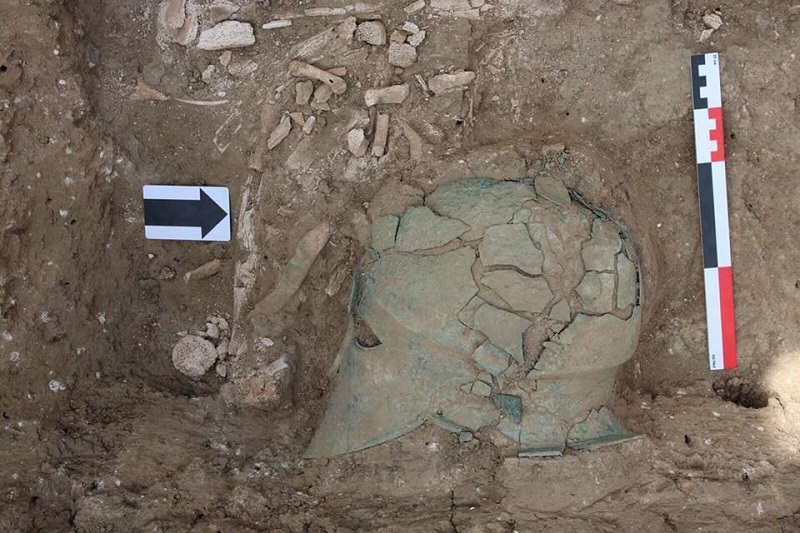In the realm of archaeology, every discovery has the potential to unravel mysteries of the past and shed light on ancient civilizations. Recently, an extraordinary find has captured the attention of scholars and enthusiasts alike: a Corinthian helmet unearthed from a 5th-century BC grave in the Taman Peninsula, southwest Russia. This remarkable artifact offers a tantalizing glimpse into the lives and customs of those who inhabited the region millennia ago. Join us as we embark on a journey to explore the significance of this discovery and delve into the rich tapestry of history it unveils.

Unveiling the Corinthian Helmet: A Window to the Past
The Corinthian helmet, renowned for its distinctive design and sturdy construction, was a staple of ancient Greek warfare. Crafted from bronze and adorned with intricate embellishments, it served as both a protective headgear and a symbol of martial prowess. The discovery of such a well-preserved specimen in the Taman Peninsula speaks volumes about the interconnectedness of ancient civilizations and the far-reaching influence of Greek culture. Through careful analysis of the helmet’s craftsmanship and historical context, archaeologists can piece together a more nuanced understanding of the cultural landscape of the region during the 5th century BC.
Journey into the Past: Unraveling the Mystery of the Grave
The grave in which the Corinthian helmet was found provides a fascinating glimpse into the funerary practices of the ancient inhabitants of the Taman Peninsula. Burial customs offer invaluable insights into societal norms, religious beliefs, and cultural traditions prevalent during a particular period in history. By meticulously documenting the contents of the grave and analyzing its spatial layout, archaeologists can reconstruct the rituals surrounding death and commemoration in ancient times. Such discoveries not only enrich our understanding of the past but also foster a deeper appreciation for the diversity of human experience across different epochs and cultures.
Significance of the Discovery: Bridging Past and Present
The discovery of the Corinthian helmet in the Taman Peninsula holds profound significance for both scholars and the general public. On a scholarly level, it provides invaluable data for researchers studying ancient warfare, metallurgy, and cultural exchange in the Mediterranean region. Moreover, it serves as a tangible link to the past, allowing us to connect with the experiences and aspirations of those who lived millennia before us. By preserving and studying artifacts such as the Corinthian helmet, we honor the legacies of our ancestors and gain valuable insights into the complexities of human history.
Meaning and Benefits of Archaeology: Illuminating Our Shared Heritage
As we marvel at the Corinthian helmet and ponder its implications, it is essential to recognize the broader significance of archaeological research. Archaeology not only enriches our understanding of the past but also fosters a sense of connection and belonging to our shared human heritage. By uncovering artifacts, deciphering ancient texts, and piecing together fragments of the past, archaeologists illuminate the path of human progress and resilience. Moreover, archaeology serves as a powerful tool for promoting cultural awareness, fostering dialogue, and preserving endangered heritage sites for future generations to cherish and study.
Conclusion:
In conclusion, the discovery of the Corinthian helmet in the Taman Peninsula serves as a poignant reminder of the enduring allure of archaeology and the boundless mysteries it holds. As we continue to unearth relics of the past and unravel the secrets of ancient civilizations, let us embrace the opportunity to learn from history and forge connections across time and space. By celebrating our shared heritage and preserving the legacy of the past, we pave the way for a more enlightened future grounded in appreciation, understanding, and respect for the diverse tapestry of human experience.